by Heather Plett | Sep 16, 2014 | Community, Leadership
“Keep away from people who try to belittle your ambitions. Small people always do that, but the really great make you feel that you, too, can become great.” ~ Mark Twain
Tomorrow, after I teach a storytelling workshop for a national non-profit, I’ll be heading out on a special annual pilgrimage. A twelve hour road trip in good company will take me to the Black Hills of South Dakota, where I will gather once again with the women of Gather the Women.
This will be my third year in this circle of women. I can hardly wait to be with them again. When I am in this circle, I feel fed, held, honoured, encouraged, and strengthened. Even though we only see each other once a year, women in this circle have supported me through the grief of losing my mother, encouraged me in the growth of my business, and cheered for me every time I’ve done something brave.
But the primary reason why I keep going back?
They call me into my greatness.
These women want me to succeed. They want me to be bold, strong, and successful. They want me to make a mark in the world. They believe wholeheartedly in my work and cheer with their whole hearts when I do it well.
Why? Because MY work is OUR collective work. And because when I succeed, we ALL succeed.
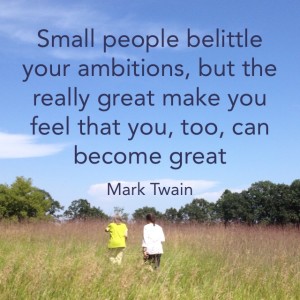 That’s the way it is when you surround yourself with powerful women who aren’t threatened by other people’s power. We succeed together and we leave the world a better place.
That’s the way it is when you surround yourself with powerful women who aren’t threatened by other people’s power. We succeed together and we leave the world a better place.
Are you longing to surround yourself with that kind of support?
I can help. What those women do for me, I want to do for you.
I want to call you into your greatness.
I want to cheer from the sidelines as you succeed. I want to nudge you into those places that feel scary but you know are right. I want to help you find your path.
How can I help you?
1. Come join Pathfinder Circle where you’ll find yourself surrounded by other women who are also daring to find their paths and step into their greatness. (It’s an online coaching circle that meets once a week for 8 weeks, starting September 30th.)
2. If you want to step into your greatness in your writing, sign up for Openhearted Writing Circle. (It’s a one-day online writing retreat, on October 4th, that will help you crack open your heart and pour it onto the page.)
3. If it’s one-on-one support you need, sign up for coaching. If you’re a leader/facilitator/teacher/coach, check out this offering.
Many years ago, when I was in my first leadership position, I realized that helping other people shine is just as good as shining yourself. Because we all benefit from each other’s glow.
Let me help you shine.
by Heather Plett | Sep 12, 2014 | grief, mandala, Uncategorized
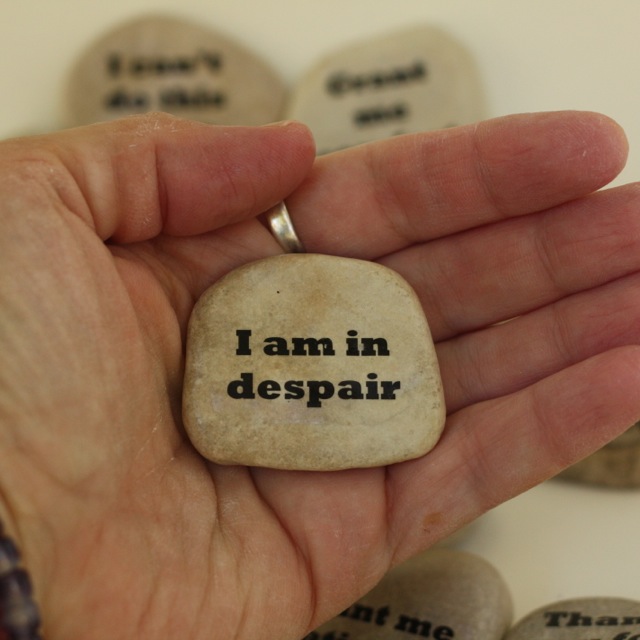 Hardly a week goes by that I don’t get an email with words like “How do you get through the rough spots in life?” Or “I feel lost. What should I do?” Or “What do you do when you are in despair?”
Hardly a week goes by that I don’t get an email with words like “How do you get through the rough spots in life?” Or “I feel lost. What should I do?” Or “What do you do when you are in despair?”
Some people are looking for coaching, some are simply asking for advice, and some have read a blog post about my own personal rough spots and think that I might have some wisdom to share. “You seem to know how to walk through the rough spots with strength and resilience,” the emails often say. “I want to know how to do that.”
Depending on the situation and the depth of the despair, I might take them on as clients, I might offer them a story or some encouragement, or I might recommend they see someone else who’s better qualified for the particular challenge the person is going through.
Hardly ever do I feel qualified to give them advice. Most of the time when I get these emails, my first reaction is “But… I’m not an expert in navigating despair. All I do is muddle through. And sometimes I feel so completely mired in it, I feel like I’m drowning. How could I possibly be of service to others?”
Last week was one of those times when I doubted my own ability to offer anything of value. Not that I was in a particular place of despair myself, but rather that I saw so much of it in the world around me that I felt completely inadequate.
Three of those emails came within the span of three days. I put off answering them, weighing my words and wanting to offer what was of the most value. Wanting, most of all, to leave these people feeling like they were not alone and that there is some tiny point of light in their darkness.
Before I had a chance to respond to any of them, I found out that an old friend (who’d been my roommate when I was 19 and entering the minefield of adulthood and independent living) was killed in a tragic car accident and had left behind three daughters just a little older than my daughters. I haven’t kept in touch with her much in recent years, so it wasn’t so much that I felt a huge hole in my own life, but I kept thinking about the people – her daughters, husband, parents, siblings, etc. – who do have huge holes in their lives. How can it be fair that three young daughters now have to navigate adulthood, parenthood, and all of the other things that are coming in their future, without their mother? Why did she have to die only a week after celebrating her daughter’s marriage?
And then I extended those thoughts and that grief to my own story and all of it felt too overwhelming. What if I lose my brother? What if my niece and nephew lose their dad just as they’re moving into adulthood? What if my sister-in-law has to learn to walk in the world as a widow?
I came home from the memorial service feeling completely raw and spent. My well was empty. I had nothing to offer, no resources to draw on. I snapped at my kids when they argued and was abrupt with my husband when he asked for something. I didn’t want to be the grown-up in any situation, much less the coach or teacher that people turned to while trying to navigate the darkness.
After a good night’s sleep, I woke up feeling a little more able to be an adult. After driving the girls to school (without any snapping), I sat down to scan Facebook, and someone had shared a TED talk by Andrew Solomon about how the worst moments in our lives make us who we are. The timing couldn’t be more perfect. Solomon talks about how we forge meaning out of the difficulty in our life, and that meaning shapes our identity.
Ah yes. We forge meaning. That’s one of the most important things that I know about the times of despair. It may be almost impossible to see it when you are in the middle of the darkness, but when you emerge, you begin to make something meaningful out of all the broken pieces of your shattered life. And as your strength grows, you realize that you are who you are partly because you survived the darkness.
After having a stillborn son, for example, I knew that that experience had been a spiritual turning point for me. Nothing before in my life had left me more awakened and hungry for a deeper faith and spirituality. And nothing else had ever made it more clear to me that I needed to follow the path of my own calling rather than trying to conform to what was expected of me. My priorities became suddenly crystal clear. My life is vastly different than it might have been if I hadn’t landed in the hospital for the final three weeks of my pregnancy and then left the hospital with empty arms. I am wiser, stronger, more clear about who I am, and more spiritually awake.
Once you’ve picked yourself up and figured out how to make something meaningful out of the mess, a few things happen:
- You realize you are stronger than you thought you were. You look back at the darkness and realize that it didn’t conquer you. You have reserves of courage and strength you didn’t know you had.
- You begin to tell different stories about yourself. You are no longer a victim. You are no longer lost. You are a survivor.
- The next time you are faced with a challenge, you face it with a little more courage than you did the last one, because you know you are capable of surviving. You know the darkness can’t conquer you. You might still get knocked off your feet, but you have a little more faith that you’ll be able to get back up again.
In the book David & Goliath, Malcolm Gladwell shares a story of the air raids on London during the Second World War. Anticipating mass hysteria and intense anxiety, the government at the time built psychiatric hospitals in preparation. But the hospitals didn’t fill up. People were much less anxious than they’d expected. Why? Because they survived. Because the first time the bombs fell, they walked away from it and realized that they were still alive and could go on. Each time the bombs fell, they got a little stronger and more able to keep on going without being paralyzed by fear.
In Pathfinder and in many of my coaching sessions, I tell people to carry a basket of courage stories with them. “Write down the stories of times when you had courage,” I say, “and then when you need a reminder, go back into that basket, pull out the stories, and remember that you are a courageous person and you can survive the darkness.”
After watching the TED talk, I finally opened my email, determined to offer the best response I could to those who were reaching out, not because I was an expert, but because I was a survivor. I’ve been through the dark – many times. I know how to look for the points of light. I know how to take tentative steps even when my feet feel mired in clay.
As I began crafting my responses, I was reminded of one of my favourite quotes from George Bernard Shaw.
“I’m not a teacher: only a fellow traveler of whom you asked the way. I pointed ahead – ahead of myself as well as you.”
I don’t claim any expertise in despair navigation. I am not a psychologist or therapist. I am only a fellow traveler who has been through the darkness many times. Surviving rape, the death of my son, the suicide attempts of my husband, the death of my mom and dad, and many other challenges, didn’t make me an expert, but they taught me to survive and to forge meaning. And that makes me not an expert, but “a fellow traveler of whom you asked the way.”
If you are in despair, I offer you these small pieces of wisdom on navigating in the dark:
1. Believe that it will one day be better than this. Nobody stays in the darkness forever. There is an ebb and flow to every life. We walk through it all and none of it lasts forever. You may not see light today, but perhaps tomorrow, perhaps next week or next month, the light will poke through.
2. Make something. There’s something about the act of production that helps make the darkness a little lighter. Bake a cake, draw a picture, make a model airplane – it doesn’t really matter what you make but it does matter that you get your hands busy and create something. One tiny act of productivity and one simple thing made by your own hands can shift a spiral of negative stories going on in your head. When my husband was in despair in the psychiatric ward, the only time I saw light in his eyes was when he was making a model airplane in the art room.
3. Move your body. Get active. Run, dance, walk, swim – do something to get your muscles moving, your heart rate up, and your adrenalin flowing again. A little dopamine flowing in your brain can help you see the points of light in the darkness. Start with something simple – walk around the block.
4. Pray. Even if you don’t have a particular faith, prayer helps. Reach out to the God of your understanding, your Higher Power, even if the only word you say is “Help!” Look outside yourself for some source of hope. As Andrew W.K. says in this article, “‘Getting down on your knees’ is not about lowering your power or being a weakling, it’s about showing respect for the size and grandeur of what we call existence — it’s about being humble in the presence of the vastness of life, space, and sensation, and acknowledging our extremely limited understanding of what it all really means.” (If prayer is unfamiliar to you, or you need some prompts, Prayer Stones might help.)
5. Talk to someone. You’re not meant to survive this time of despair alone. We are social animals – we’re meant to live in community. There is no shame in asking for support. Start with a friend, family member, or someone you trust. Or reach out to your doctor, find a therapist, or look into grief coaching. If you need someone to help you find a place to start, you can contact me. I don’t have the answers for everything, but I know a lot of people working in helping professions – one of them might be the right person for you.
6. Get outside. Stand in the sunshine. Get fresh air. Lean on a tree. Nature heals. Breathe in the oxygen the trees offer as a gift, watch the seasons change, and remind yourself of the way the earth regenerates herself, moving from death to life and back again. Spring comes back every year. Life returns to the landscape that lies dormant under the snow.
One of the people who’d emailed me earlier had made a special request of me. It wasn’t advice or coaching she was looking for – she simply wanted me to pray and make a prayer mandala for her. And so I did, because – like it says above – prayer helps, and making something helps. I made it for her and I made it for myself and I made it for all of the other people around me who are currently in despair.
With my house full of stones these days, I decided to make a prayer mandala out of stones. I started at the centre, choosing a few Prayer Stones. 
The mandala grew, and at the outer edges I added Intention Stones that reflected the meaning that I have forged out of my own times of despair and that I wish for those still in it.


The act of making the mandala, even without any words coming out of my mouth, was my prayer, my offering up of those things that are outside of my control and outside of my understanding, and my way of catalyzing the overwhelm and feeling of inadequacy.

May you find your way through whatever challenge you find yourself in and will you know peace and grace. And may the meaning that you make of it all become the gift you offer the world.
Prayer Stones and Intention Stones are available in my Etsy Shop. And if you’re interested in being part of a coaching circle that will help you find your way, check out Pathfinder Circle, starting again on September 30th.
by Heather Plett | Sep 9, 2014 | mandala

The Magic of Mandalas Blog Hop is a radically inspiring sharing circle, with artists from around the globe sharing the stories behind their process of creating mandalas. Our mission: To inspire you to see new possibilities for your own creative practice.
Click here to discover new artists, soak up new ideas and fill up on creative inspiration to fuel your creative practice.
I love words. I always have and I always will. Words have come naturally to me since I started my first journal at the age of ten. Nearly every major event in my life – whether hard, easy, good, or bad – has been processed in my journal through words. Most of my career, in fact, was guided by words – I worked as a professional communicator.
But sometimes words are not enough.
Sometimes words limit the brain, keeping it stuck in old patterns. Sometimes you need more than just words. And sometimes things happen that are too monumental, too confusing, or too full of pain or beauty to put to words.
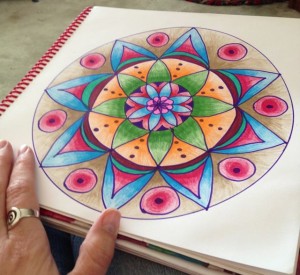 That’s when I turn to mandalas. Mandalas open spaces in the brain that words can’t access. Mandalas tap into the creative right brain processes that move us through things in fresh and often surprising ways. Mandalas help us shift into a more mindful space where the words spinning through our minds are silenced for awhile and the real wisdom can speak.
That’s when I turn to mandalas. Mandalas open spaces in the brain that words can’t access. Mandalas tap into the creative right brain processes that move us through things in fresh and often surprising ways. Mandalas help us shift into a more mindful space where the words spinning through our minds are silenced for awhile and the real wisdom can speak.
Right now, people are working their way through the September offering of Mandala Discovery, and I am enjoying the sharing that’s going on in the Facebook group. People are often surprised by what is cracked open by the Mandala Journal prompts.
“It feels so nurturing to me – like my soul is starving for this kind of thing, and I finally get to feed it what it wants,” said one person.
“My Inner Child emerged,” said another. “I got memories of being afraid and turning to nature to make me feel safe.”
“I love how a mandala can be simple and still be deep, complex and beautiful,” said a third.
Often my mandalas combine words with images, accessing both right and left brain patterns. If you want to try a unique mandala process that’s about stopping the spiral of self-doubt, here’s one.
The next offering of Mandala Discovery will be in January 2015, with registration opening in December 2014. Add your name to my email list (on the top right) to stay informed.
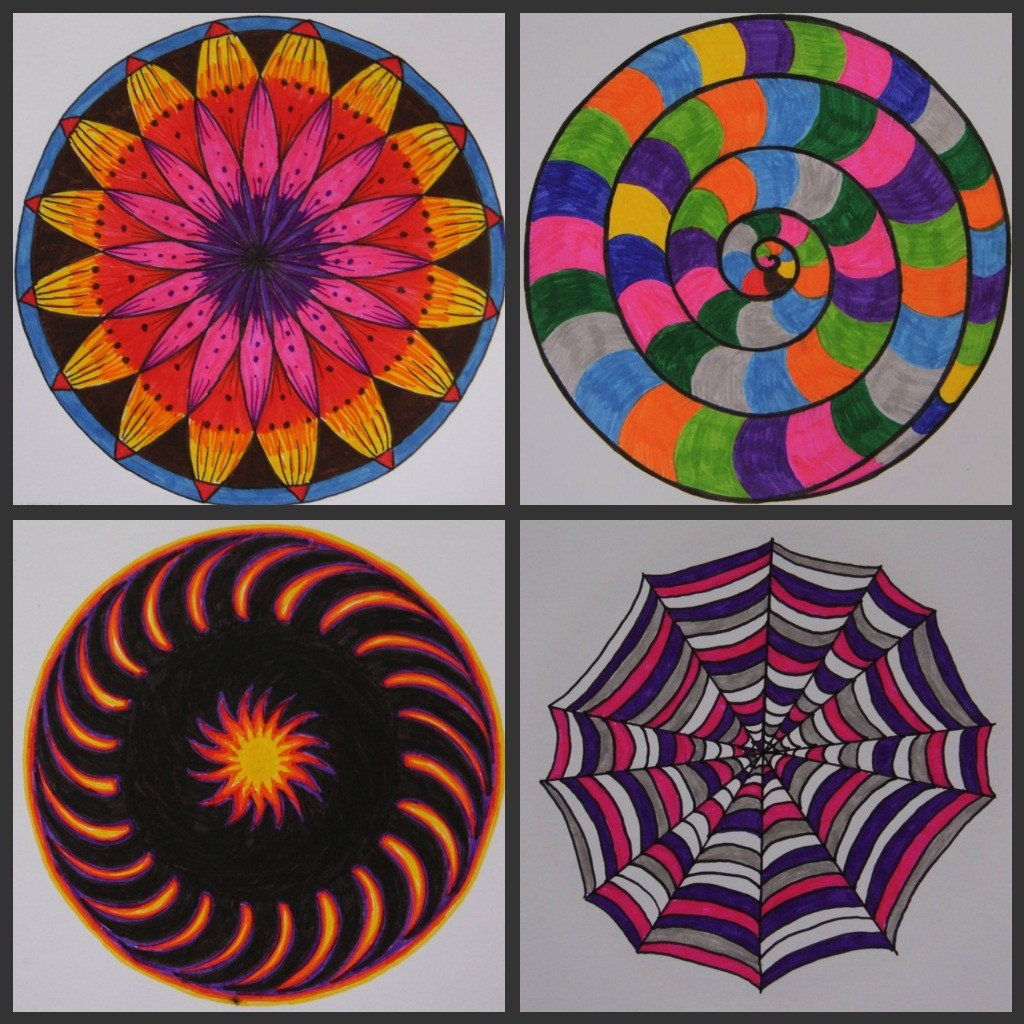
by Heather Plett | Sep 7, 2014 | art of hosting, Leadership
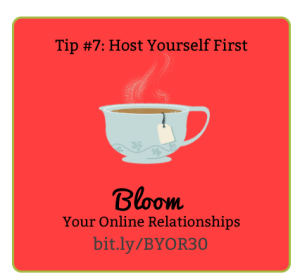 This post is part of the 30-Day Bloom Your Online Relationships Challenge. If you’d like to play along, you can sign up here (don’t worry — it’s FREE). We’re working through these small, powerful actions together and sharing our questions, learnings and experiences in a Facebook group. And we’d love to have you join us!
This post is part of the 30-Day Bloom Your Online Relationships Challenge. If you’d like to play along, you can sign up here (don’t worry — it’s FREE). We’re working through these small, powerful actions together and sharing our questions, learnings and experiences in a Facebook group. And we’d love to have you join us!
In the group facilitation work I do (in The Art of Hosting and Harvesting Meaningful Conversations), there’s a mantra that we repeat to ourselves long before we enter the room to host a retreat, facilitate a planning session, mediate a conflict, teach a class, etc. It’s simple – just three words…
Host yourself first.
What does it mean to “host yourself first”? It means, simply, that anything I am prepared to encounter once I walk into that room, I need to be prepared to encounter and host in myself first. In order to prepare myself for conflict, frustration, ego, fear, anger, weariness, envy, injustice, etc., I need to sit with myself, look into my own heart, bear witness to what I see there, and address it in whatever way I need to before I can do it for others. I can’t hide any of that stuff in the shadows, because what is hidden there tends to come out in ways I don’t want it to when I am under stress inside the room.
AND just as I am prepared to offer compassion, understanding, forgiveness, and resolution to anything that shows up in the room, I need to offer it to myself first. Only when I am present for myself and compassionate with myself will I be prepared to host with strength and courage.
To serve the world well, I need to serve myself first.
How do I do that? I do it by being honest with myself about my emotions, by engaging in the creative/spiritual practices that sustain and enrich me, by working things through in my journal or in a walk in the woods, by engaging in self-care, by getting support from the right people, and by claiming my own power and authority before I step into the room.
A few years ago, I was frustrated over what was happening on social media and I started questioning my presence there. I was getting dragged down by pettiness, I was feeling pressured into “doing social media marketing the way the pros tell me to”, I was wasting too much time in mindless surfing, and it was all feeling rather icky. I was suddenly painfully aware that I’d let go of my authentic voice and my sense of purpose.
And then the words I’d repeated so often in my in-person work came back to me… “Host yourself first.” Oh yeah… right.
So I asked myself, “what if I apply this to my presence on social media?” What if, when I’m on Facebook or Twitter, I take myself more seriously and consider myself to be “hosting meaningful conversations” the way I’m doing in retreats and in the classroom? What if – before I post anything – I check in with myself to test the emotions around what I’m posting and to make sure it’s coming from a place of authenticity and positivity rather than ego and marketing? What if, before I walk into the “room” on Facebook, I make sure I’m clear about my own values and passions and boundaries? How will that change the way I interact?
I started experimenting with it, and it didn’t take long to realize that my online presence had shifted. I was returning to my authentic voice. I wasn’t just posting for the sake of being popular or funny or to make a sale. I didn’t do anything just because the pros told me I should do it, but instead I did what flowed organically from who I was and how I wanted to be in the world.
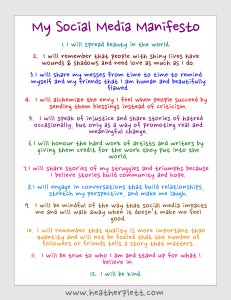 To solidify my commitment to hosting myself first online, I wrote my social media manifesto, naming all of my intentions in how I wanted to show up online. (Click on it to see it larger, or scroll to the bottom of the page.) I shared it and invited others to do the same.
To solidify my commitment to hosting myself first online, I wrote my social media manifesto, naming all of my intentions in how I wanted to show up online. (Click on it to see it larger, or scroll to the bottom of the page.) I shared it and invited others to do the same.
People started responding. Beautiful conversations resulted. New and deeper relationships grew. More people bought what I was selling because it was coming from the kind of authentic heart that people were longing for. My business grew and my social media reach grew, but more importantly my relationships grew.
How do you host yourself first?
Here are a few tips:
1. Do your personal work before you go online. Start with whatever creative/spiritual practice sustains and enriches you – art, meditation, journaling, dance, walking, etc.
2. Sit with your emotions before you broadcast them. Are you angry, sad, disappointed, confused? Sit with them for awhile, without judgement, and honour what is showing up. Ask yourself: “Is this is an emotion that is worth sharing (and perhaps asking for support for) or worth holding close to my heart?”
3. Ask yourself each day how you can be of service to the world. How can you serve the people in your social media stream – with uplifting posts, with humour, with invitations to justice and compassion, with offers to support them, with meaningful conversation, with reminders of how beautiful/kind/courageous/resilient they are?
4. Remind yourself that each person in your social media stream (including yourself) wants to be loved. When you think of it that way, then the things they do that annoy you are softened somewhat because you recognize in them a quest for attention and love.
5. Choose your own mantra that you repeat to yourself before you post or respond to anything. It can simply be a question: “Is this authentic to who I am?” or “Is this serving the world in a positive way?” Or a statement “I choose beauty.” or “I am a messenger of light.”
6. Think of yourself as a facilitator or host when you appear on social media. If this were a party or retreat you were hosting, what kind of atmosphere would you like to create? How would you like to make people feel about themselves? What kind of conversations do you want to facilitate?
7. Be as kind to yourself as you would be to anyone else you’re hosting. If you were hosting a party and someone was feeling down and discouraged, you’d sit next to them and listen to them and offer encouragement. If they were celebrating something, you’d celebrate with them. Offer the same kind of compassion, encouragement, and friendship to yourself. When you do that to yourself first, you’ll feel much stronger and more able to withstand the highs and lows of social media engagement.
8. Write your own social media manifesto. Start by journaling about all of the things that are important to you about how you want to engage online. Then write a list of your commitments. Share them or keep them to yourself – whatever feels right. If you want to, share them in the BYOR Facebook group.
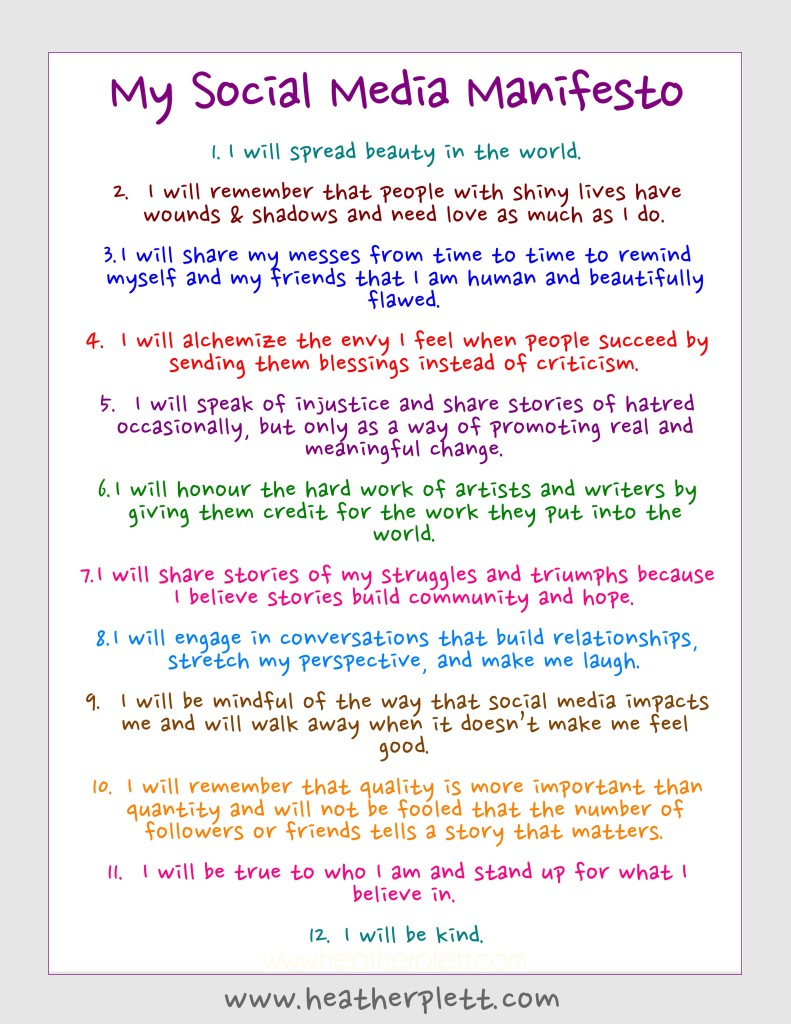
NOTE: When you’re done trying out today’s challenge, come visit us on Facebook and let us know how it went. What did you share? What was the response? Was it easy for you? Hard? No right or wrong answers here — we’re all just experimenting!
Image credit: Leyton Parker
by Heather Plett | Sep 6, 2014 | Community, connection, Wisdom
Earlier today, I posted this on Facebook:
Let’s pretend we’re setting off on a long, leisurely walk together. Just you and I. We’re walking along the shore, an eagle is flying overhead, there’s just the right kind of gentle breeze on our faces. We dip our toes in the water now and then. Now, tell me… what would you like to talk about if you had all the time in the world for a conversation?
A little while later, after people had shared what they’d love to talk about, and several said they’d like to simply walk in silence, I said this:
The sun is shining. There’s nothing urgent I need to do. I’m going out for a real walk. I’ll pretend I’m taking you all with me.
On a whim, while I was walking, I started sharing photos from my walk, with the hashtag #ifyouwereherewithme. Here’s the sequence. Imagine we were on that walk together.
If you were here with me, I’d take you to my favourite place to wander, where deer often greet me and butterflies flit among the milkweed.

If you were here with me, we’d sit for a spell when the conversation got so juicy we’d need to look into each other’s eyes.

If you were here with me, I’d introduce you to the tree I call the Dancing Goddess Tree because of the way she reaches her thick limbs to the sky in praise.

If you were here with me, I’d tell you about the Spring I sat on the stone bench among the birch trees and wept because I realized I’d lived through a whole season without my mom.

If you were here with me, I’d invite you to leave the beaten path and step into the wild with me.

If you were here with me, we’d stop to stare in awe at the eagle circling above our heads.

If you were here with me, I’d tell you how I dream of living by water, and how the Red River near my house has to suffice for now.

If you were here with me, I’d tell you about the time I broke my foot and felt such a strong hunger for this place, I had my husband drop me off at the gate so I could limp part way in on crutches.
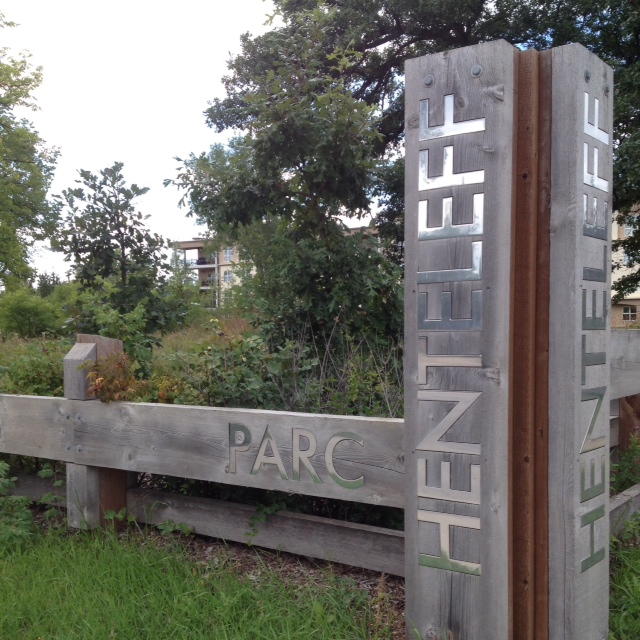
If you were here with me, I’d pour you a glass of iced tea and invite you to sit awhile when our wandering was done.

Thanks for coming for a walk with me!
 That’s the way it is when you surround yourself with powerful women who aren’t threatened by other people’s power. We succeed together and we leave the world a better place.
That’s the way it is when you surround yourself with powerful women who aren’t threatened by other people’s power. We succeed together and we leave the world a better place.



















